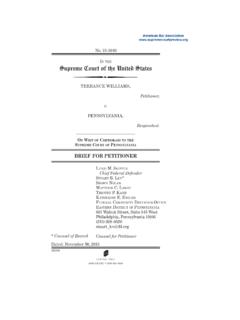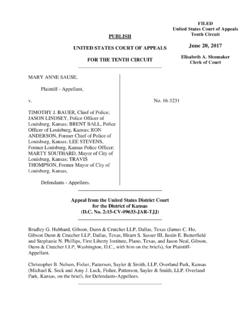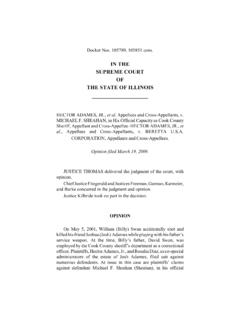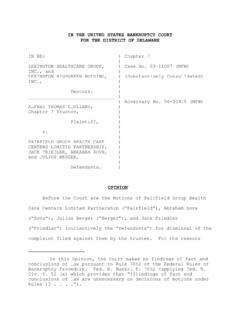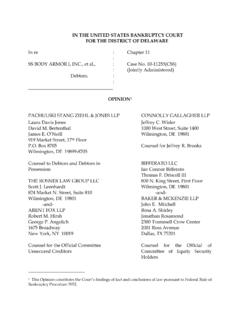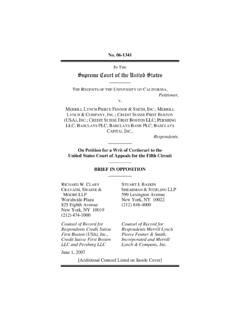Transcription of In the Supreme Court of the United States - SCOTUSblog
1 In the Supreme Court of the United StatesIn the Supreme Court of the United StatesIn the Supreme Court of the United StatesIn the Supreme Court of the United StatesIn the Supreme Court of the United StatesJERRY JAMGOTCHIAN,Petitioner, HORSE RACING COMMISSION;JOHN T. WARD, JR., in his official capacity asExecutive Director, Kentucky Horse Racing Commission;ROBERT M. BECK, JR., in his official capacity asChairman, Kentucky Horse Racing Commission; andTRACY FARMER, in his official capacity as Vice-Chair,Kentucky Horse Racing Commission, petition for Writ of Certiorari to theSupreme Court of KentuckyREPLY BRIEF FOR PETITIONERRICHARD A. GETTY Counsel of RecordKRISTOPHER D. COLLMANTHE GETTY LAW group , PLLC1900 lexington Financial Center250 West Main StreetLexington, Kentucky 40507(859) E.
2 SALAMANCA279 Cassidy AvenueLexington, Kentucky 40502(859) for PetitionerBecker Gallagher Cincinnati, OH Washington, 16-171iTABLE OF CONTENTSREPLY IN SUPPORT OF A petition FOR A WRIT OF 1A. Kentucky s Rule Obviously DiscriminatesAgainst Interstate Commerce and theSupreme Court of Kentucky ObviouslyApplied the Wrong Test .. 1B. A Destabilizing Split of Authority ExistsBetween the Decision Below and the PositionTaken by Responsible Public Bodies inCalifornia .. 6 CONCLUSION .. 10iiTABLE OF AUTHORITIESCASESFort Gratiot Sanitary Landfill, Inc. v. Michigan Dept. of Natural Resources, 504 353 (1992).. 5 Hughes v. Oklahoma, 441 322 (1979).. 1, 3, 4, 5 Hunt v. Washington State Apple Advertising Comm n, 432 333 (1977).
3 2, 3, 9 Medimmune, Inc. v. Genentech, Inc., 549 118 (2007).. 9 New Energy Co. of Ind. v. Limbach, 486 269 (1988).. 5 Philadelphia v. New Jersey, 437 617 (1978).. 1, 2, 4, 6 South-Central Timber Development Co., Inc. , 467 82 (1984).. 3 REGULATION810 KAR 1:015, 1 (6)(b).. 1 RULESSup. Ct. R. 10(c).. 6 Sup. Ct. R. 16(1) .. 61 REPLY IN SUPPORT OF A petition FOR AWRIT OF CERTIORARIP etitioner Jerry Jamgotchian respectfully submitsthis Reply in support of his petition for a Writ Kentucky s Rule Obviously DiscriminatesAgainst Interstate Commerce and theSupreme Court of Kentucky ObviouslyApplied the Wrong is not one of those thorny cases where thediscriminatory nature of a regulation can be knownonly by its practical effect.
4 See Hughes v. Oklahoma,441 322, 336 (1979). Simply by reading the rule,this Court can see what Kentucky is doing:Unless the stewards grant permission for aclaimed horse to enter and start at anoverlapping or conflicting meeting in Kentucky,a horse shall not race elsewhere until the close ofentries of the meeting at which it was Kentucky Administrative Regulations 1:015, 1(6)(b) (emphasis added). As Justice Brennan noted inHughes, [s]uch facial discrimination by itself may bea fatal defect, regardless of the State s purpose,because the evil of protectionism can reside inlegislative means as well as legislative ends. Id. at322 (quoting Philadelphia v. New Jersey, 437 617,626 (1978)).
5 At a minimum, he went on to say, suchfacial discrimination invokes the strictest scrutiny ofany purported legitimate local purpose and of theabsence of nondiscriminatory alternatives. Supreme Court of Kentucky undertook no suchanalysis. Although it did identify an abstract goal ofprotecting the integrity of claiming races, it neverasked whether the state had a non-discriminatoryoption, and Respondents all but concede that they didnot suggest In effect, the Supreme Court ofKentucky gave the rule a pass because of its friendlyrelatives. Notwithstanding a modicum ofdiscrimination, it wrote, Article 6 is part of a larger,non-discriminatory racing regulation, not a traderegulation, and its protectionist effect is negligiblecompared with its important racing benefits.
6 30. More importantly, it added,this regulation is knowingly and voluntarilyagreed to by an owner seeking the advantages ofclaiming race purchase; it is the legalconsequence of a particular type of businesstransaction, not an unavoidable governmentalregulation affecting all commerce inthoroughbred horses in the the extent this analysis is not factually wrong, itis beside the point. The rule does not come from thetrack, which is in the private sector, but from the state,1 In their response to the petition , Respondents assume arguendothat they did not produce evidence of record thatnondiscriminatory means were unavailable for advancing thestated purpose of the regulation.
7 Brief in Opposition at 12(quoting petition at 11). This comes as something of a surprise,given that Respondents bore the burden of proffering this evidence. See Hunt v. Washington State Apple Advertising Comm n, 432 , 353 (1977).3through the Horse Racing Commission. This alonerenders it other than knowingly and voluntarilyagreed to. To be sure, Jamgotchian could buy a horseoutside a claiming race, but if he chose to buy a horsein a claiming race, he would be subject to the facts of almost any other case decided by thisCourt under the Dormant Commerce Clause are thesame. If Hughes had bought commercially raisedminnows as opposed to minnows obtained from thewaters of Oklahoma he could have sold them outsidethe state.
8 See Hughes, 441 at 325. If South-Central had chosen not to buy wood directly fromAlaska, it would not have been obliged to have it semi-processed in the state. See South-Central TimberDevelopment Co., Inc. v. Wunnicke, 467 82, 84(1984). The fact that both Hughes and South-Centralhad alternatives is irrelevant because this Court sproper focus is on where the state does discriminate,not where it does purpose of close judicial scrutiny, as this Courthas observed in a variety of contexts, is to put thegovernment to the test. See Hunt v. Washington StateApple Advertising Comm n, 432 333, 353 (1977). If a state wants to discriminate against interstatecommerce, let it explain why it has no alternative, andlet the courts evaluate that explanation.
9 The virtue of2 It is also entirely beside the point that Kentucky does notdiscriminate on the basis of state of citizenship. See Brief inOpposition at i, 5. This was Justice Rehnquist s argument indissent in Hughes v. Oklahoma. See 441 322, 344 (1979)(Rehnquist, J., dissenting). The Supreme Court of Kentucky itselfrejects this argument. See Pet. App. 18 process is that it identifies instances where theevil of protectionism .. reside[s] in legislative means[instead of] legislative ends. Hughes, 441 at 322(quoting Philadelphia v. New Jersey, 437 at 626). That did not happen here, although Respondents hadevery opportunity to make their case and explain theirnon-discriminatory options, if Supreme Court of Kentucky appears toconclude that the cost of claiming a horse must beraised to deter frivolous claims and aggressiveclaiming practices that arise from the claiming rule s overbreadth.
10 Pet. App. 38. But anyone who has evertaken Economics 101 might ask, if the price is set toolow to deter frivolous claims, why not raise it? To besure, forbidding a horse to race in another state is away to raise the price, but it is a way of doing so thatovertly discriminates against interstate commerce andappears to protect local interests. If a horse runs in a$40,000 claiming race, as did Rochitta, and someonehas no desire to run her in another state, $40,000 is thereal price. If, by contrast, a horse runs in that race andsomeone such as Petitioner has a desire to runher in another state, the real price is more than$40,000, because of the opportunity cost o f c l a i m i n g j a i l .Respondents had every opportunity to answer thisquestion.
